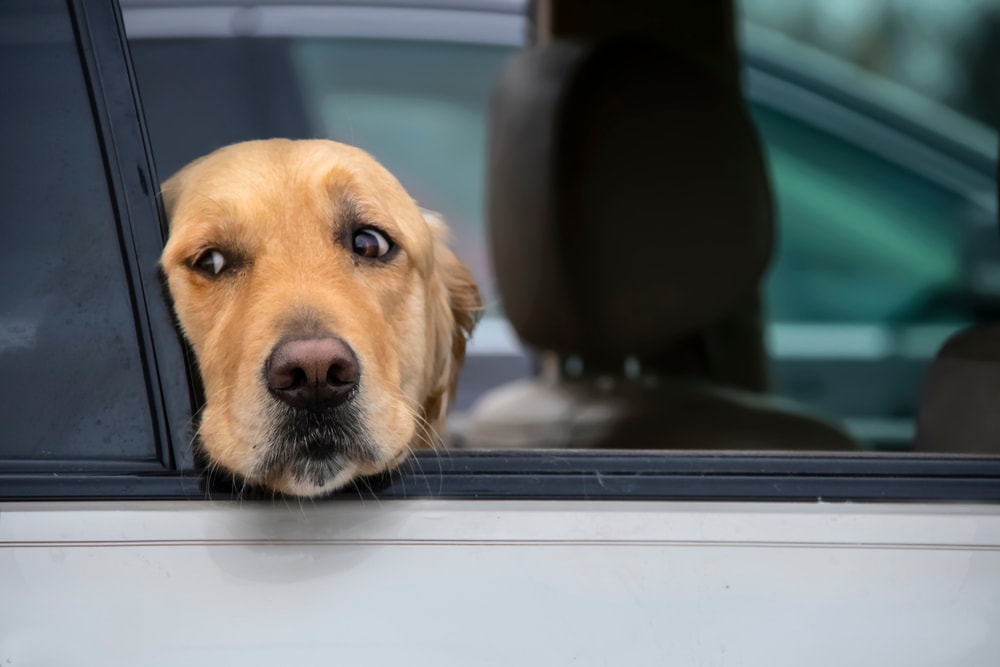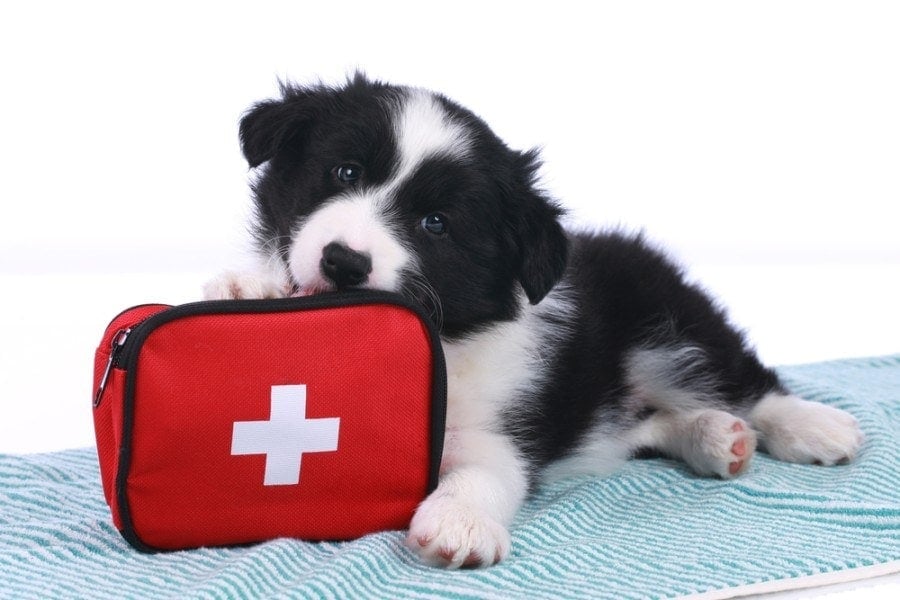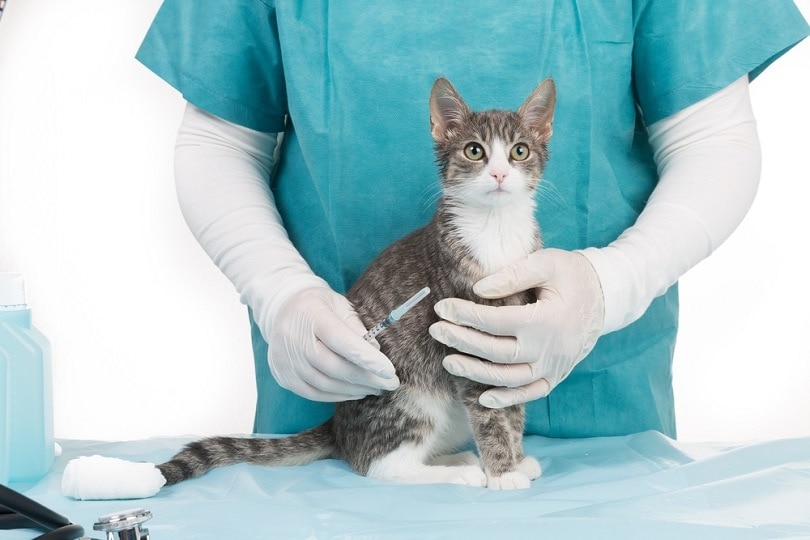8 Safety Tips for Pets During a Hurricane (& Emergency Prep List)
Updated on

Hurricanes are a stressful and dangerous time for everyone involved. However, pets are at an even higher risk, as they don’t qualify for much of the aid given out after and before hurricanes. For instance, many evacuation shelters do not allow pets, making evacuating during a hurricane a challenge for pet owners.
Being prepared is one of the few ways you can make hurricane season safer for your pets. It helps to be prepared well in advance, so you aren’t scrambling when you find yourself in the path of a hurricane. Here are some tips, including a complete emergency prep list for pets.
The 8 Pet Safety Tips to Prepare for a Hurricane:
1. Keep Animals Secure
Whether you’re evacuating or riding out a hurricane, keep your pooch secure in a carrier or crate. Your pet may become scared during the store or transport. Therefore, keeping them in a crate ensures they remain under control and somewhere safe.
The hurricane may break out your windows or destroy doors. Pets can escape through these damaged areas in an attempt to get away from the storm. Of course, outside is a very dangerous place to be during a hurricane. The crate or carrier works as a back-up should your home become damaged.
2. Prepare an Emergency Bag for Your Pet

If you have to evacuate quickly, it helps to have an emergency bag ready to go. While you should have all of your belongings, it helps to have a separate bag for your pet. Alternatively, you can pack your pet’s emergency supplies into your bag.
What you should include in your pet’s emergency bag depends a lot. What a cat needs is completely different than what a dog needs. You should think about the items your pet needs to survive for three days. You don’t need to bring everything they might need – just the basics.
- Food and drinks. You don’t know whether the water will be safe to drink, and most emergency shelters do not have pet food.
- Toiletry needs. You may need to bring pee pads, paper towels, and similar items for your cat to use while out and about. Of course, if your cat is used to going outside, a set of poo bags is often all you need. Cats are a bit more complicated, but most of them will go outside when prompted, too.
- Medical records. Vaccination requirements are not suspended during hurricanes. You may be asked for proof of your pet’s medical status. Therefore, you should bring all vaccination records and other important documents with you. Print them out and laminate them to ensure they don’t get crumbled or wet. You can also put the records on a flash drive, and then place the flash drive in a Ziplock bag. Consider writing down anything that is medically important for your dog, such as allergies. If you become separated for your dog or have to leave them at a boarding facility, this information can help keep them healthy.
- You should have your pet’s medications on hand, too, especially if they are necessary for your pet’s quality of life. Supplements aren’t necessarily required, but diabetes and heart medication are.
- Get a sturdy, reflective leash to transport your pet. Leashes are inexpensive, so there is little reason not to have an extra for these emergencies. Consider packing extra collars, as well.
- Can opener. If your pet eats canned food that requires a can opener, be sure to pack one.
- First aid supplies. We recommend having quick-clot powder and similar medical supplies for your pet. You shouldn’t plan on treating anything substantial, but vets likely won’t be around during a hurricane.
3. Microchip Your Pet
Microchips are an extremely minor procedure and surprisingly cheap. However, in events like a hurricane, it can help reunite you with your canine. It’s a form of permanent identification that cannot be damaged due to the wind or rain.
Always keep your contact information up to date with the microchipping company. A microchip is only useful if it provides the correct information to whoever finds your pet.
4. Update Vaccinations

Diseases are more likely during hurricanes and similar emergencies, when flood waters rise and hygiene deteriorates. Therefore, you should ensure that your pet is updated on all vaccinations. You may want to talk to your vet about vaccinations that are not necessarily required, but may be helpful at preventing diseases that are common during hurricanes.
Be sure your pet is up-to-date before every hurricane season.
5. Have a Plan
If you have friends or family members within driving distance, you may want to consider having a plan for them to take care of your pets during hurricanes. Preferably, you may want to try having multiple designated caregivers in case plan A doesn’t work. Make sure these caregivers are knowledgeable about your pet’s needs, including medications and allergy information.
Having friends and family close by can also be helpful. While these individuals are also affected by the hurricane, they can watch your pet in the event that something happens to you. Alternatively, if you’re away when the hurricane hits, they should be provided with a key to your house to access your pet. Having these plans already in place is extremely helpful when emergencies pop up.
6. Download the FEMA App
We highly recommend downloading the FEMA app, which provides information about pet-friendly shelters. In an emergency, you may need to visit one of these shelters. Not all emergency shelters allow pets, especially if they are smaller. Therefore, you’ll need to find a shelter that explicitly allows them. Sometimes, you even need to give the shelter advanced warning or reserve a spot for your pet.
The FEMA app provides all this information. Download it before the hurricane hits.
7. Stay Calm
Pets pick up on our stress. Evacuation is already going to be stressful for your dog. However, if your pet sees that you’re stressed out too, this is only going to add to their anxiety. Staying calm is vital to ensuring that your pet remains calm, too.
For pets that are already anxious, you may want to speak to your vet about anti-anxiety medication for hurricanes. While this medication shouldn’t be used excessively, stressful events like hurricanes and evacuations may call for them. Of course, not all pets benefit from this medication, and it does have side effects. Therefore, your vet is the best expert to advise you on your pet’s specific situation.

8. Stay Informed
Everyone should have a NOAA Weather Radio to stay informed during emergencies. These radios help you keep track of the weather and locate help if you need it. Even if you don’t have a pet, you should have one.
With that said, they are even more essential when you have someone else relying on you, like an animal. Even if you can tough it out, your pet may not be able to. Be sure to consider the potential dangers to your pet and obey any evacuation warnings. NOAA Weather Radios may also provide information about pet-friendly evacuation centers, though the FEMA app is often more reliable.
Conclusion
Having a pet during a hurricane is challenging. Much aid is directed at humans only, which can leave your pet in a sticky situation. For instance, many evacuation centers do not allow pets, so you’ll need to set up alternative plans in case you need to leave your home.
You should have three days’ worth of supplies for both you and your pet in case the hurricane traps you in your home. Having medical records and medications on hand is also vital, as you never know when these items will be destroyed by a hurricane.
Featured Image Credit: Vineyard Perspective, Shutterstock











